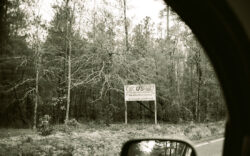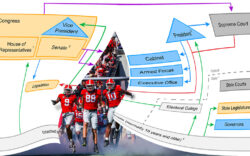The ugly firing of Banner-Herald Managing Editor Allison Floyd last week by Publisher Scott Morrissey and Vice President for Audience Andrea Griffith sent shock waves through our community. “Ugly,†because they fired her for doing her job, checking a fact in a press release from the school system. They fired her after school superintendent Philip Lanoue picked up the telephone and called publisher Morrisaey.
There are two sides to everything, and this is a one-sided account of what happened to Floyd. The circumstantial evidence makes it look like a working journalist was fired because she stepped on the toe of her publisher’s golfing buddy. The whole thing looks even worse because the question Allison Floyd asked pertained to the Classic City High School, where the principal, Kelly Girtz, is the domestic partner of Vice President Griffith. Publisher Morrissey and Vice President for Audience Griffith surely had reasons sufficient to them for getting rid of Editor Floyd, but to do it after a phone call from the superintendent makes everybody look bad.
The essence of journalism is checking facts. That’s what reporters and editors do. The work of a journalist is asking questions. Journalists call people or interview them face to face or email them and ask them questions, trying to get at the facts. Journalists call people in positions of authority and ask them questions. People in authority are not always comfortable with those questions. They may decline to answer, or they learn to answer without saying anything or by changing the subject. Tenacious journalists are frequently put in the position of being pests, asking embarrassing questions of people in power. That’s their job, and they can get away with it, because they’re calling from the newspaper, and the newspaper is a public institution that can stand up to people in power. Those powerful people may not like the newspaper calling them up and asking them questions, but they have to acknowledge the public’s right to know what is going on if the press stands up for that right. The press is a watchdog, an antagonist, an adversary to those who run things and don’t want to have to explain themselves.
Every time journalists call or email or confront, they’re relying on the understanding that they’re not just Allison Floyd, they’re the newspaper calling. The newspaper stands behind them. Without the newspaper behind them, they’re just nosy pests on the phone. That’s what happened to Floyd last week. When the blowback came, the newspaper wasn’t behind her. Her publisher didn’t back her up. From now on, every Banner-Herald reporter who dials the phone to ask the tough questions that get the information that informs the public will have to wonder whether the public official that he or she is calling will in turn pick up the phone and call the publisher. Will this call cost them their job?
Superintendent Lanoue is no doubt horrified that his call to his friend at the paper got an editor fired. But there are plenty of people in this community and every other who will do whatever they can to hide the truth and intimidate the press or anybody else working in the public interest who offends special interests.
When a telephone call can silence a journalist, we’re confronted by the realization that power and money and influence can control what we know or what we don’t know. A publisher has a difficult job directing a news organization and running a business at the same time. It’s a delicate balance, but that’s what publishers do. Publishers at chain newspapers have an additional, and controlling, obligation to their corporate owners, who must put the demands of the out-of-town corporation ahead of local needs. Chain ownership was a cash cow when the economy was good; it is a liability now, an additional pressure point for those seeking to silence the news. If the Banner-Herald owner, the Morris company, continues to falter, can the Banner-Herald provide Athens with the news it needs? Can reporters and editors keep on making those calls, knowing that somebody has their back, or will they always have to fear that their newspaper will back down? The bad economy could wipe us all out—chains and local newspapers alike. But we shouldn’t contribute to our own demise. It will remain our duty until the end to “print the news and raise hell.â€
Pete McCommons [email protected]
Like what you just read? Support Flagpole by making a donation today. Every dollar you give helps fund our ongoing mission to provide Athens with quality, independent journalism.










